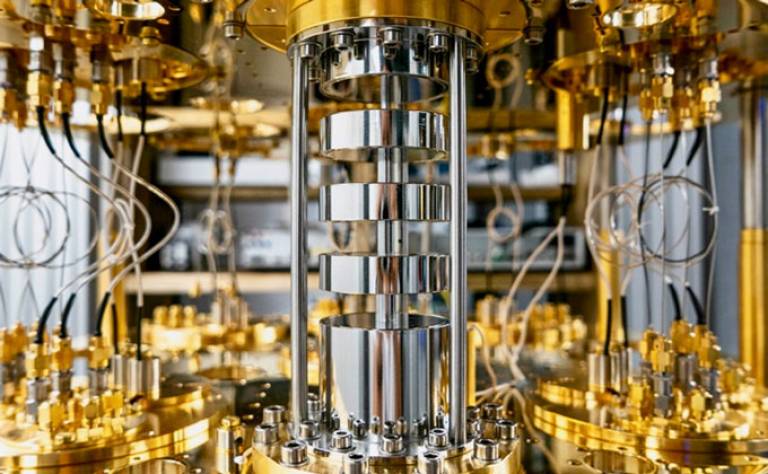UCLQ on the "quantum bottleneck"
15 January 2020
UCLQ researchers discuss the skills shortage in quantum computing.

Today UCLQ featured in The Guardian discussing the skills shortage in quantum computing:
"There is a laboratory deep within University College London (UCL) that looks like a cross between a rebel base in Star Wars and a scene imagined by Jules Verne. Hidden within the miles of cables, blinking electronic equipment and screens is a gold-coloured contraption known as a dilution refrigerator. Its job is to chill the highly sensitive equipment needed to build a quantum computer to close to absolute zero, the coldest temperature in the known universe. Standing around the refrigerator are students from Germany, Spain and China, who are studying to become members of an elite profession that has never existed before: quantum engineering. These scientists take the developments in quantum mechanics over the past century and turn them into revolutionary real-world applications."
In the article Quantum Motion, a UCLQ start-up, comment on what analysts call the "quantum bottleneck” - where the demand for quantum engineers outstrips the number available:
“The lack of access to a pipeline of talent will pose an existential threat to our company, and others like it,” says James Palles-Dimmock, commercial director of London- and Oxford-based startup Quantum Motion. “You are not going to make a quantum computer with 1,000 average people – you need 10 to 100 incredibly good people, and that’ll be the case for everybody worldwide, so access to the best talent is going to define which companies succeed and which fail.”
Professor Paul Warburton, Director of UCLQ's EPSRC Centre for Doctoral Training in Quantum Technologies argues that to meet this demand we need a broader range of skills:
“We are still overwhelmingly recruiting physicists,” says Paul Warburton. “We really need to massively increase the number of PhD students from outside the physics domain to really transform this sector.” The second problem, according to Warburton, is competition with the US. “Anyone who graduates with a PhD in quantum technologies in this country is well sought after in the USA.”
Warburton concludes that the UK needs to train its own quantum engineers:
“We can’t rely on getting our technology from other nations. We need to have our own quantum technology capability.”
Read the article in full in The Guardian.
IMAGE CAPTION: A dilution refrigerator at UCLQ.
 Close
Close

